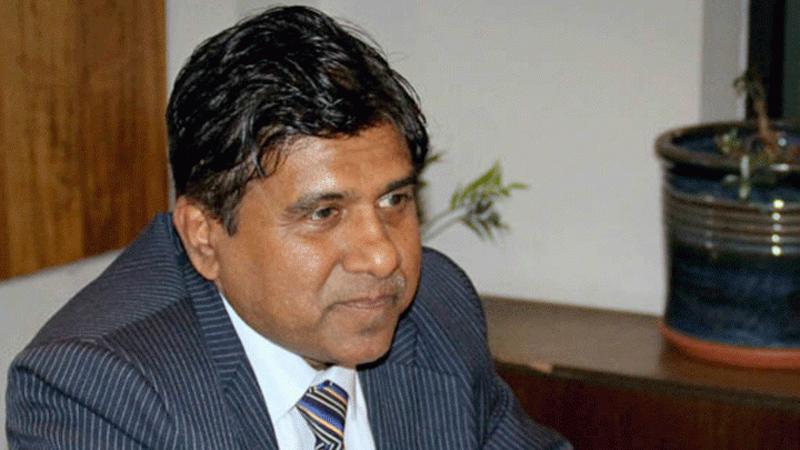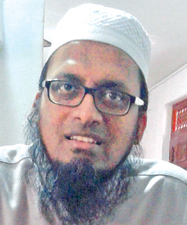
The extremely sensitive topic of Islamic State (IS) infiltration, was once again rekindled following an explosive statement by Justice Minister Wijeyadasa Rajapakshe in Parliament, recently, where he alleged that the educated, and the elite of the Sri Lankan Muslim community have joined the ISIS in Syria.
The statement was immediately rejected by the Muslim Council of Sri Lanka
(MCSL) and the All Ceylon Jammiyyathul Ulema, (ACJU) who claim to represent 99 per cent of the Sri Lankan Muslim community, who are moderate.
The ACJU’s Media Secretary Fazil Farook, said that the words spoken by the Minister in Parliament echoed sentiments of the Buddhist extremists and described things that happened in the past.
Hot on the heels of this incident, Minister Rajapakshe on Tuesday afternoon, met a delegation led by Bodu Bala Sena leader Galagoda Aththe Gnanasara Thera and a group of Muslim leaders, including representatives of the ACJU and the MCSL on Wednesday, where discussions focused on diffusing the growing tensions among the communities.
A ministerial committee comprising the Ministers for Buddhist Religious Affairs Wijedasa Rajapakshe, Muslim Religious Affairs, Abdul Haleem, Hindu Religious Affairs, D.M.Swaminathan and Christian Affairs, John Amaratunga were appointed to look into the matter and create a platform for discussion.
Minister Rajapakshe said, the four Ministers would offer leadership to meaningful and constructive dialogue to settle issues through cordial means. According to him the BBS leaders have thanked him for the opportunity to take part in the dialogue. Despite coming under scathing criticism by various groups, Minister Rajapakshe told the Sunday Observer, there was a need to talk about these difficult issues openly.
“I raised this matter in Parliament because we need to openly discuss and get the relevant parties together and build trust among the communities. We cannot sweep things under the carpet and hope that all will be well,” he said.
Although the Sri Lankan Muslim community is by and large shielded from external extremist elements by the moderate Jamayyithtul Ulemas, to which a large majority of the Islamic faith belongs, extremist forms of Islam had always been trying to make its way here, with the blessings of foreign Islamic charities, often funded by non-state actors.
The most recent incident of sectarian violence in Sri Lanka was reported in 2009, when two youth were killed in a Beruwala mosque, Masjidul Rahman, which was blamed on the Thawheed Jamaat group, who claim to practise the teachings of Quran in its purest form. The situation became so intense at the time that the police and the STF stood guard outside non-Thawheed mosques in the East during prayer time, especially, during Isha –the night prayer.
In addition to the Thawheed group, there are a few other similar groups, e.g. Tablighi Jamaat, which has a lesser number of followers. The first official record of a Sri Lankan youth joining the jihadist movement overseas dates back to 1991. It was mentioned in the diary of a Palestinian man, a member of the Mujahideens in Afghanistan, fighting the Russian army. The Palestinian fighter, Abu Zubaydah was captured by US troops and sent to a detention camp in Cuba. He had written in his diary that he met a Sri Lankan fighter among others in a training camp in Afghanistan. The Sri Lankan he met in Afghanistan was known as Abu al-Fatih.
The latest threats of IS infiltration here was reported when a Sri Lankan martial arts expert and a teacher from Galewela was killed in Syria in July last year. The news was first reported in the ISIS magazine Dabiq.
According to the report Mohamed Muhsin Shafraz Nilam, in his mid-thirties was killed in Raqqa, in a US led coalition airstrike. He had studied Sharia Law in Pakistan and seems to have been lured to ISIS through the social media.
The ACJU and other moderate Muslim groups denied any recruitment drive by ISIS in Sri Lanka, and said that statements such as the one made by Justice Minister will only serve to strengthen the extremists across both sides of the divide. However, a Sri Lankan security expert and an ex-military officer, currently conducting a research on the ISIS presence in Sri Lanka and the Maldives refutes this notion.
He says, the official data on Sri Lankan fighters in Syria may be limited to 7-8 persons, but there could be a bigger Sri Lankan team of ISIS fighters and some may not be direct travellers from here. He had visited a couple of countries bordering Syria as part of his research. Based on personal interviews, he said, there could be a big gap between actual figures and reported numbers.
According to him, Sri Lankans transit at Turkey or Iraq to get to southern Syria to join the ISIS. He said, despite the ISIS 2020 Caliphate map which includes Sri Lanka as part of their kingdom, the group may not try to spread its wings here. Instead, there is a possibility of Sri Lanka being used for admin, logistic and recruitment purposes, especially, as a platform to recruit Maldivian nationals, a possibility the law enforcement authority has officially denied thus far.
However, a police intelligence source confirmed they were investigating the possibility of Sri Lanka being used as a transit point for Maldivian ISIS recruits.
The ACJU has denounced violence as well as all radical forms of practising Islam, while openly criticizing the ISIS in a bid to protect the moderate Muslims who have lived in Sri Lanka for hundreds of years. Their efforts need to be complimented by the law enforcement establishment in order to keep up with the momentum maintained by the ISIS and their charismatic leaders.
ACJU Media Secretary Fazil Farook
The information communicated in Parliament by the Justice Minister is not the current situation. We met the Minister to ask him if there was a basis to what he said, if there were 32 ISIS members joining from Sri Lanka and foreign extremists delivering sermons in Sri Lankan Madrasas.
 These are what took place three to four years ago. According to intelligence reports, these are also suspected incidents, without any confirmed reports.
These are what took place three to four years ago. According to intelligence reports, these are also suspected incidents, without any confirmed reports.
I belong to the ACJU, the largely represented Islamic body in the country.
In 2014, the ACJU was one of the very first Muslim organizations in the world to speak against the use of brands like, Jihad and ISIS. We condemned these movements. Last year, the Sri Lankan Muslim organizations issued a joint declaration condemning the ISIS and other extremist movements that destroy world peace.
We have maintained a distance from all those movements.
Even before the state apparatus stepping in to take action, we have blocked extremists from coming here to deliver sermons in our mosques. We made the Minister understand, the position taken by the ACJU, during the Halal issue. We accepted the majority community’s concerns and agreed to drop the Halal logo.
We have lived in this country for over 1,000 years. We believe, the biggest threat in the country is not extremism, but creating suspicion and promoting distrust. Suspicion is a grave sin, it creates vengeance, anger, hatred, violence and disaster.
Ninety per cent of our friends are Buddhists. We grew up in this land and we understand the feelings of each other.
Being Sri Lankans, we have accepted the Constitution. We follow the Quran and the life of Prophet Mohamed. Ever since the killing inside a mosque in Beruwala, the ACJU formed a division called CCC – Cordination and Coorporation Centre.
All Muslim organizations became partners and agreed to settle differences through dialogue with the leaders. Ever since, we have lived peacefully.
We have also condemned the actions of certain groups who organized demonstrations carrying children recently, as regards the age limit for marriage, etc. They are members of an extreme group which does not have the support of the majority in the community.
Yes, the caliphate of the ISIS says Sri Lanka will be part of their kingdom in 2020. But the state intelligence has no documentary proof to say the ISIS is operating in Sri Lanka. The Islamic world at large has denounced the caliphate.
The ACJU, together with all Muslim bodies has denounced it. We do not support it. I can only tell you about my country and my people. If we really wanted a change, we could have stood with the LTTE when they had the upper hand.
But, the Muslims sacrificed their lives for the country, they do not want such leaders to rule us. They always prefer to work with the majority community. At the independence when the Tamil community put forth various demands, we Muslims had zero demands. For this spirit the Muslims earned a lot of respect and recognition. Till today we have lived up to that spirit.
